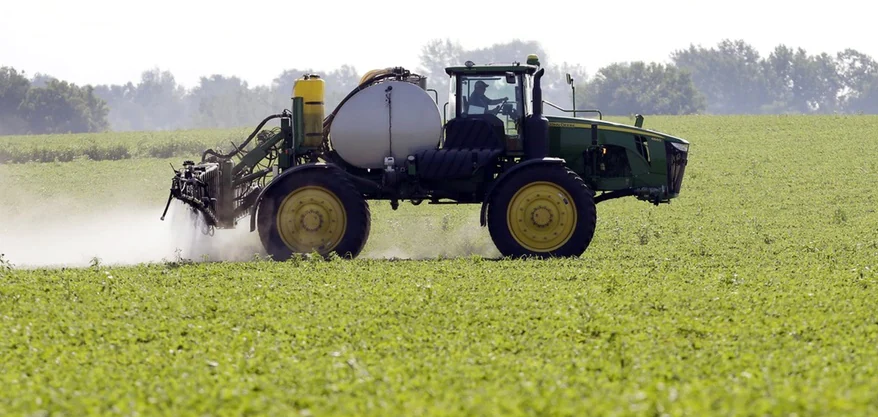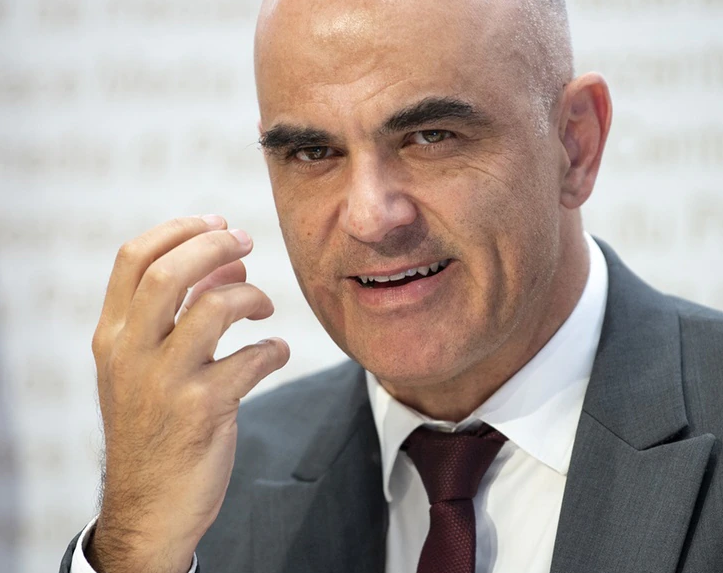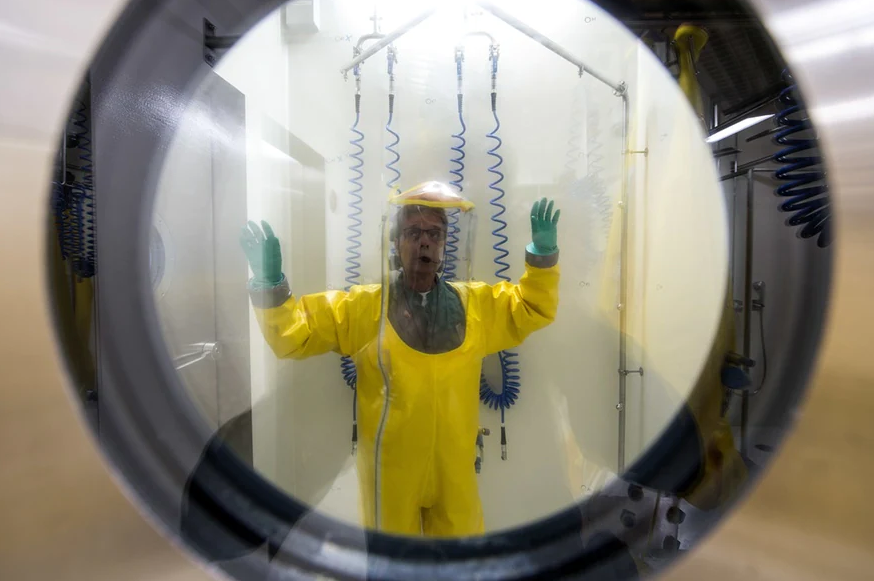Paraquat has been sold in the US since the 1960s and through acquisitions, mergers and spin-offs it ended up in Syngenta’s product portfolio. Keystone / Charlie Neibergall The Swiss-based multinational has already set aside 7.5 million (CHF 171 million) to settle legal cases filed by farmers exposed to paraquat. But the total bill could run into billions as lawsuits pile up. American farmer Doug Holliday has helped feed the nation for decades, growing corn and soybeans and raising cattle on thousands of acres of land outside Greenfield, a rural city of some 2,000 people in the midwestern state of Iowa. Married with two children, Holliday was hoping that at 59 he’d be counting down to a quiet retirement with his wife, having downsized his farm to a 450-acre
Topics:
Swissinfo considers the following as important: 3.) Swissinfo Business and Economy, 3) Swiss Markets and News, Featured, health, newsletter
This could be interesting, too:
Nachrichten Ticker - www.finanzen.ch writes Die Performance der Kryptowährungen in KW 9: Das hat sich bei Bitcoin, Ether & Co. getan
Nachrichten Ticker - www.finanzen.ch writes Wer verbirgt sich hinter der Ethereum-Technologie?
Martin Hartmann writes Eine Analyse nach den Lehren von Milton Friedman
Marc Chandler writes March 2025 Monthly

Paraquat has been sold in the US since the 1960s and through acquisitions, mergers and spin-offs it ended up in Syngenta’s product portfolio. Keystone / Charlie Neibergall
The Swiss-based multinational has already set aside $187.5 million (CHF 171 million) to settle legal cases filed by farmers exposed to paraquat. But the total bill could run into billions as lawsuits pile up.
American farmer Doug Holliday has helped feed the nation for decades, growing corn and soybeans and raising cattle on thousands of acres of land outside Greenfield, a rural city of some 2,000 people in the midwestern state of Iowa.
Married with two children, Holliday was hoping that at 59 he’d be counting down to a quiet retirement with his wife, having downsized his farm to a 450-acre holding three years ago. Instead, he’s decided to go into battle with one of the world’s biggest suppliers of pesticides and seeds – Switzerland-based Syngenta Group.
He has joined hundreds of farmers across the United States who have filed product liability lawsuits against the company over its failure to warn them that its top-selling herbicide, paraquat, is linked to serious health problems including Parkinson’s disease. Farmers exposed to the toxic chemical, including many who have already developed the debilitating and incurable brain disorder, are also seeking financial compensation for non-economic and economic losses such as medical costs and loss of income.
For years, Holliday was a heavy user of paraquat, which is sold all over the world mostly under the brand name Gramoxone. It is used to control invasive weeds that affect crops and in the US, it is most widely used to spray on soybeans, cotton, corn and fruit orchards. Over the past decade, successive studies have linked the herbicide to a higher risk of developing Parkinson’s, the 10th leading cause of death among the over 65s in the US and which was responsible for almost 35,000 deaths in this age group in 2019. A study sponsored by the National Institute of Environmental Health Sciences published in 2011 found that users of the herbicide developed the neurodegenerative disease 2.5 times more often than non-users.
“Not knowing any of this I used paraquat and sprayed it myself on a large farm in the 1990s,” Holliday told SWI swissinfo.ch in a telephone interview. “I physically handled it and had to pour it multiple times into the sprayer as it was only sold in 2.5-gallon jugs.”
The main physical symptoms of Parkinson’s are tremors, slowness of movement and muscle stiffness, while cognitive symptoms include depression and dementia. There is no cure and sufferers are more vulnerable to serious and life-threatening infections. As the symptoms grow progressively more severe over time so do the costs of treatment. The Parkinson’s Foundation in the US says medication alone cost an average $2,500 a year and therapeutic surgery can cost up to $100,000 per person.
Although he has no symptoms, Holliday believes he is at increased risk of developing Parkinson’s because of his exposure to paraquat. If and when he is diagnosed with the disease, his health insurance premiums will soar and he won’t be able to afford to pay for treatment until he becomes eligible for Medicare, the federal health insurance system for people aged 65 and older. That’s why the Greenfield farmer decided to launch his action against Syngenta, which was taken over by China National Chemical Corp., a Chinese state-owned enterprise in 2016.
“You’re talking to a guy that writes a cheque out every month for health insurance for me, my wife and two children and I run a large deductible,” he said. “Healthcare is a major expense for me and adds up to $35,000 a year and climbing.”
Paraquat has been sold in the US since the 1960s and through acquisitions, mergers and spin-offs it ended up in the product portfolio of Basel-headquartered Syngenta. According to Syngenta, it is no longer registered for sale in 72 countries, including Switzerland and China, but is still being sold in 27 countries including America, where it is classed as a restricted use pesticide. That means users, including farmers, must be trained and certified to use it.
“It is even banned in China even though the Chinese now own Syngenta,” said Holliday. “We are almost like guinea pigs and everyone is paying for it.”
Despite a growing body of research pointing to the health risks associated with paraquat use and calls from the Parkinson’s Foundation and the Unified Parkinson’s Advocacy Council for its registration to be canceled, paraquat was re-approved for another 15 years by the US Environmental Protection Agency (EPA) in July 2021, albeit with tighter restrictions to address concerns about its health risks. That decision is now being challenged in the courts by Earthjustice, a US nonprofit public interest environmental law organisation.
Farmers including Holliday decided to take matters into their own hands, encouraged by law firms who saw parallels with another popular herbicide, Roundup, which has been alleged to cause non-Hodgkins lymphoma, a type of cancer.
Roundup was produced by US agrochemical group Monsanto which was taken over in 2018 by Bayer AG, a German multinational pharmaceuticals and life sciences group. As of July this year, Bayer has set aside $16 billion to deal with litigation involving some 125,000 claims, around 96,000 of which have been settled and the remainder are pending appeal at the US Supreme Court.
The potential for another huge settlement from an agrochemical giant has prompted a flurry of advertisements encouraging American farmers with Parkinson’s disease and those who have used paraquat to file legal claims against Syngenta.
“I don’t watch much TV but even I’ve seen the TV ads. It is all over social media too,” said Holliday.
In May, he filed a class action suit – joined by at least a hundred other farmers – against Syngenta in the district court for the southern district of Iowa, accusing the company of failing to warn farmers of the known dangers and potential risks of using paraquat, failing to adequately test the herbicide, selling a dangerous product, and negligence to remedy its failings. He wants the company to pay for medical testing and monitoring for Parkinson’s to ensure farmers get early detection and treatment for the disease.
Lawsuits mount
Holliday’s case is one of around 380, mostly class action, lawsuits that have been launched in the US against Syngenta, which has repeatedly said there is “no credible evidence” that paraquat causes Parkinson’s, that all claims are “without merit,” and that it will defend any lawsuits. The company told SWI swissinfo.ch by email that it “cannot comment at this time due to ongoing litigation and quiet period regulations.” Syngenta is in the process of filing for an Initial Public Offering on the Shanghai Stock Exchange. Many firms choose to impose a quiet period of at least two weeks before listing, even if not required by law, to avoid risks of liability for information published ahead the stock offering.
The first lawsuit against Syngenta was filed to a state court in 2017 by Thomas and Diana Hoffman and several other plaintiffs and is still awaiting trial. The first case in a federal court was filed in July 2020 in the state of Missouri on behalf of Henry Holyfield. Holyfield was an agricultural worker who sprayed pesticides, including paraquat, from a crop-dusting aircraft from 1965 to 1975 and was diagnosed with Parkinson’s disease in 2015.
In June, a judicial panel ruled that all federal lawsuits should be grouped together in what is known as a mass tort and heard in the Southern District of Illinois. Federal Judge Nancy Rosenstengel, who will be overseeing the centralised action, has set a date for a jury trial of November 15, 2022. As of mid-October, there were approximately 330 actions in federal courts and 50 in state courts, according to data compiled by the United States Judicial Panel on Multidistrict Litigation, although it’s not clear how many individuals are involved.
“What that means is that one federal judge will coordinate the discovery, depositions and document production to make the legal process go smoothly for both sides,” said Lawrence Cohan of Philadelphia law firm Saltz Mongeluzzi & Bendesky, who has worked in chemical exposure litigation for more than 40 years. “But ultimately every individual is entitled to their own trial.”
Cohan’s firm filed a case on behalf of a Parkinson’s sufferer and his wife in the district court for the eastern district of Pennsylvania in April. He wants a jury trial for his clients unless Syngenta is ready to offer a “fair and appropriate settlement.” Cohan declined to disclose how much his clients would settle for and said it is too early to predict the total amount Syngenta will have to fork out to settle all the claims.
“Every victim has experienced their own loss and projecting the value of a claim in a vacuum is impossible,” he said. “Some folks with Parkinson’s disease have catastrophic outcomes and extremely difficult lives; they become disabled, unable to work or raise a family and Parkinson’s can lead to a difficult and painful death. Every case is going to have to be evaluated individually on its own merits.”
Nevertheless, some law firms, like Maryland-based Miller & Zois, have tried to provide an estimate to potential clients.
“The paraquat product liability litigation is still in the early stages so there have not been any settlements yet,” the firm said on the dedicated paraquat page on its website. “However, based on settlements in prior cases involving similar claims and injuries, we believe paraquat claims in the highest settlement tier could have a value between $150,000 and $240,000.”
In its half-yearly financial report released at the end of August, Syngenta disclosed that it had “reached a master settlement agreement with certain Paraquat claimants” and had paid $187.5 million into a settlement fund in July. The company also stated it believed all the claims were without merit and that the agreement to settle had been made “solely for the purpose of bringing to an end these claims.”
There are unlikely to be as many claims against paraquat as there were against Roundup because unlike Roundup, which anyone could use, farmers need to undergo an EPA-approved training programme to qualify as “certified applicators” in order to mix, load and spray the herbicide. The training – compulsory as of 2016 – must be retaken every three years.
Swiss concern
Although paraquat was banned in Switzerland in 1989, the government has become increasingly concerned about the impact on farmers’ health of exposure to pesticides. It commissioned a report to look into the issue in preparation for a national action plan to reduce the use of plant protection products. Both the report and the national action plan were published in 2017.
A meta-analysis of the scientific literature by the report’s authors concluded that there was “moderate evidence” linking paraquat exposure to Parkinson’s disease. The report also stated that exposure to any plant protection product involved a 50% or more risk of developing Parkinson’s among regular users. But it concluded that more evidence was needed regarding exposure to specific classes of pesticides and active ingredients.
So far, however, no progress has been made on gathering that evidence.
“There has been no study in Switzerland that looks at the health of farmers and use of agrochemicals,” said Aurélie Berthet, a senior researcher at Unisanté, the Center for Primary Care and Public Health at the University of Lausanne in western Switzerland, and one of the authors of the 2017 report. “Another problem is that in Switzerland, the doctor does not record the profession of the patient. So, we do not have any information on occupational diseases which would be great for epidemiological studies.”
The health of farmers has been neglected because they are a small group and are not covered by occupational health insurance like other professions, she said. In addition, studying a group of farmers for a long period of time is very expensive and it is difficult to get funding to study the health effects of a specific exposure to pesticides in Switzerland. As a result, scientists and decision-makers have come to rely on results extrapolated from farmer cohorts in neighbouring France and Germany.
There’s no such shortage of research or data in the US however, and lawyers, who usually act on a no-win no-fee basis, see the odds are in their favour in terms of winning compensation for their clients, especially after their success against Bayer and Roundup.
According to a fact sheet published by Syngenta, paraquat today accounts for less than 2% of its total sales and 1% of its profit. But it could become a long-running sore for the company both in terms of the impact of adverse publicity on sales and in terms of the financial costs. These are yet unquantifiable but the $187.5 million the company has set aside so far is likely to represent a small portion of the total potential payout which could take several years to determine.
The first Roundup product liability cases were filed against Monsanto in 2015 but it wasn’t until 2020 that Bayer agreed to its initial $10.9 billion settlement, which was subsequently increased to $16 billion in 2021. It could take until 2022 before plaintiffs actually get their hands on the cash.
The wait may be too long for some paraquat victims as they are likely to die before any agreement is reached and money is paid out. Holliday, who is still healthy, may be one of the lucky ones.
“The end game is monetary settlement and testing,” said Holliday. “We need to have testing so that people that have been around paraquat can get ahead of it and take medicine that will slow Parkinson’s down.”
Tags: Featured,Health,newsletter








